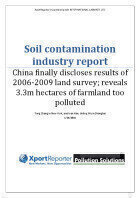Soil Remediation
China finally discloses results of 2006-2009 land survey; reveals 3.3m hectares of farmland too polluted
Jan 16 2014
Author: Tong Zhang in New York, and Ivan Han, Jinling Wu in Shanghai on behalf of XportReporter
Prevention and control of soil pollution has become the latest environmental issue to reach the top of China’s legislative agenda in recent months, following revelations earlier this year that portions of the country’s rice supply was tainted with the toxic heavy metal, cadmium. The country’s Ministry of Environmental Protection (MEP) plans to release a comprehensive action plan on soil pollution soon, the ministry announced on 8 December.
The MEP has also set a timeline though 2017 for legislative measures.
Soil remediation is still a relatively new concern for the country, which has a host of other environmental issues it has pledged to tackle. Investment in soil remediation is expected to reach the thousands of billions yuan, exceeding funds planned for water and air pollution control measures, which are also large financial undertakings by the government. This could open a soil restoration market in the country, which currently accounts for just 3.7% of China’s environmental services industry. The huge gap between China’s soil remediation technological capabilities and those that exist in advanced economies presents opportunities for foreign companies specializing in this area. As part of the policy guidelines to facilitate environmental protection industry released in August, the government put emphasis on developing in-situ immobilization, ectopic fixative, bio-remediation, safe disposal, and resource utilization technologies.
Soil remediation will also drive the growth of heavy metal source monitoring for protecting farmland and water resources, controlling sources of pollution and risk management of contaminated land.
However, problems still exist that are constraining the development of the market. As an infant industry, China lacks well established technological standards, fee-charging standards and market mechanisms for soil remediation. Some domestic companies focus more on temporal efficiency, which compromise the long-term goal by adding a secondary pollution.
Events
IWA World Water Congress & Exhibition
Aug 11 2024 Toronto, Canada
Aug 25 2024 Stockholm, Sweden and online
Sep 03 2024 Mexico City, Mexico
Sep 03 2024 Mexico City, Mexico
Sep 03 2024 San Diego, CA, USA










